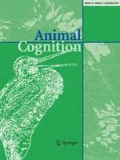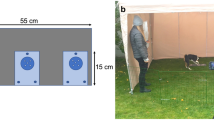Abstract
Communication between dogs and humans is a topic of growing interest, and the “unsolvable task” is a common method used to measure human-directed communication. In this task, dogs learn how to solve a problem to obtain a reward. After a fixed number of trials, the reward becomes impossible to access, arguably leading to communicative attempts from the dog. Although useful to observe dogs’ communicative behaviors in a fairly naturalistic situation, the methodology varies among studies regarding apparatus, number of trials, and other factors. The proxies used, for instance, gaze duration or frequency of gaze alternation, also vary, and there are discrepancies and a debate regarding what the task actually measures. Therefore, in this study, we reviewed the usage of the unsolvable task in canids of the genus Canis, searching Web of Science and Scopus for the terms “dog*”, “Canis”, “dingo*”, “wolf” or “wolves” in the title and "unsolvable task" or "impossible task" in the topic. We included thirty-five studies in this review and discussed their different methodologies and proxies, such as different apparatuses, number of solvable trials, and different interpretations of “looking back”, pointing out how they can affect results and hinder comparisons. Lastly, we used current data to propose strategies to homogenize the use of this important paradigm, with an ethogram of possible behaviors and their interpretation and a predefined set of methodological aspects for future research.

Adapted from Moher (2009)

Similar content being viewed by others
References
Agnetta B, Hare B, Tomasello M (2000) Cues to food location that domestic dogs (Canis familiaris) of different ages do and do not use. Anim Cogn 3(2):107–112. https://doi.org/10.1007/s100710000070
Albuquerque N, Guo K, Wilkinson A, Resende B, Mills DS (2018) Mouth-licking by dogs as a response to emotional stimuli. Behav Proc 146:42–45. https://doi.org/10.1016/j.beproc.2017.11.006
Alterisio A, Baragli P, Aria M, D’Aniello B, Scandurra A (2018) Could the visual differential attention be a referential gesture? A study on Horses (Equus caballus) on the impossible task paradigm. Animals 8(7):120. https://doi.org/10.3390/ani8070120
Barrera G, Mustaca A, Bentosela M (2011) Communication between domestic dogs and humans: Effects of shelter housing upon the gaze to the human. Anim Cogn 14(5):727–734. https://doi.org/10.1007/s10071-011-0407-4
Cabral FG (2019) Produção comunicativa de cães (Canis familiaris) para acesso a alimento visível e oculto. Master’s thesis. University of São Paulo. https://doi.org/10.11606/D.47.2020.tde-13032020-15432
Carballo F, Cavalli C, Martínez M, Dzik V, Bentosela M (2020) Asking for help: do dogs take into account prior experiences with people? Learn Behav. https://doi.org/10.3758/s13420-020-00425-6
Cavalli C, Carballo F, Bentosela M (2018) Gazing behavior during problem solving tasks in domestic dogs. A critical review. Dog Behav 4(3):23–44. https://doi.org/10.4454/db.v4i3.68
Cavalli C, Carballo F, Dzik MV, Bentosela M (2019) Gazing as a help requesting behavior: a comparison of dogs participating in animal-assisted interventions and pet dogs. Anim Cogn 23(1):141–147. https://doi.org/10.1007/s10071-019-01324-8
D’Aniello B, Scandurra A (2016) Ontogenetic effects on gazing behaviour: a case study of kennel dogs (Labrador Retrievers) in the impossible task paradigm. Anim Cogn 19(3):565–570. https://doi.org/10.1007/s10071-016-0958-5
D’Aniello B, Scandurra A, Prato-Previde E, Valsecchi P (2015) Gazing toward humans: a study on water rescue dogs using the impossible task paradigm. Behav Proc 110:68–73. https://doi.org/10.1016/j.beproc.2014.09.022
Fraga PP, Gerencsér L, Lovas M, Újváry D, Andics A (2021) Who turns to the human? Companion pigs’ and dogs’ behaviour in the unsolvable task paradigm. Anim Cogn 24(1):33–40
Gaunet F (2008) How do guide dogs of blind owners and pet dogs of sighted owners (Canis familiaris) ask their owners for food? Anim Cogn 11(3):475–483. https://doi.org/10.1007/s10071-008-0138-3
Hall NJ (2017) Persistence and resistance to extinction in the domestic dog: Basic research and applications to canine training. Behav Processes 141:67–74
Hare B (2002) The domestication of social cognition in dogs. Science 298(5598):1634–1636. https://doi.org/10.1126/science.1072702
Hare B, Rosati A, Kaminski J, Bräuer J, Call J, Tomasello M (2010) The domestication hypothesis for dogs' skills with human communication: a response to Udell et al. (2008) and Wynne et al. (2008). Anim Behav 79(2):e1–e6
Hori Y, Kishi H, Inoue-Murayama M, Fujita K (2013) Dopamine receptor D4 gene (DRD4) is associated with gazing toward humans in domestic dogs (Canis familiaris). Open J Anim Sci 03(01):54–58
Horn L, Virányi Z, Miklósi A, Huber L, Range F (2012) Domestic dogs (Canis familiaris) flexibly adjust their human-directed behavior to the actions of their human partners in a problem situation. Anim Cogn 15(1):57–71
Horn L, Huber L, Range F, Dornhaus A (2013) The importance of the secure base effect for domestic dogs – evidence from a manipulative problem-solving task. PLoS ONE 8(5):e65296
Kiss O, Kovács K, Szánthó F, Topál J (2018) Similarity between an unfamiliar human and the owner affects dogs’ preference for human partner when responding to an unsolvable problem. Learn Behav 46(4):430–441. https://doi.org/10.3758/s13420-018-0337-y
Konno A, Romero T, Inoue-Murayama M, Saito A, Hasegawa T (2016) Dog breed differences in visual communication with humans. PLoS ONE. https://doi.org/10.1371/journal.pone.0164760
Kovács K, Kis A, Pogány A, Koller D, Topál J (2016) Differential effects of oxytocin on social sensitivity in two distinct breeds of dogs (Canis familiaris). Psychoneuroendocrinology 74:212–220
Kubinyi E, Iotchev IB (2020) A preliminary study toward a rapid assessment of age-related behavioral differences in family dogs. Animals 10(7):1222
Langbein J, Krause A, Nawroth C (2018) Human-directed behaviour in goats is not affected by short-term positive handling. Anim Cogn 21:795–803. https://doi.org/10.1007/s10071-018-1211-1
Lazarowski L, Strassberg LR, Waggoner LP, Katz JS (2019) Persistence and human-directed behavior in detection dogs: ontogenetic development and relationships to working dog success. Appl Anim Behav Sci 220:104860. https://doi.org/10.1016/j.applanim.2019.104860
Lazarowski L, Thompkins A, Krichbaum S, Waggoner LP, Deshpande G, Katz JS (2020) Comparing pet and detection dogs (Canis familiaris) on two aspects of social cognition. Learn Behav 48(4):432–443
Lazzaroni M, Range F, Bernasconi L, Darc L, Holtsch M, Massimei R, Marshall-Pescini S et al (2019) The role of life experience in affecting persistence: a comparative study between free-ranging dogs, pet dogs and captive pack dogs. PLoS ONE. https://doi.org/10.1371/journal.pone.0214806
Lazzaroni M, Marshall-Pescini S, Manzenreiter H, Gosch S, Přibilová L, Darc L, Range F et al (2020) Why do dogs look back at the human in an impossible task? Looking back behaviour may be over-interpreted. Anim Cogn 23(3):427–441. https://doi.org/10.1007/s10071-020-01345-8
Leavens DA, Russell JL, Hopkins WD (2005) Intentionality as measured in the persistence and elaboration of communication by Chimpanzees (Pan troglodytes). Child Dev 76(1):291–306
Maglieri V, Prato-Previde E, Tommasi E, Palagi E (2019) Wolf-like or dog-like? A comparison of gazing behaviour across three dog breeds tested in their familiar environments. R Soc Open Sci 6(9):190946. https://doi.org/10.1098/rsos.190946
Marshall-Pescini S, Passalacqua C, Barnard S, Valsecchi P, Prato-Previde E (2009) Agility and search and rescue training differently affects pet dogs’ behaviour in socio-cognitive tasks. Behav Proc 81(3):416–422. https://doi.org/10.1016/j.beproc.2009.03.015
Marshall-Pescini S, Colombo E, Passalacqua C, Merola I, Prato-Previde E (2013) Gaze alternation in dogs and toddlers in an unsolvable task: evidence of an audience effect. Anim Cogn 16(6):933–943. https://doi.org/10.1007/s10071-013-0627-x
Marshall-Pescini S, Rao A, Virányi Z, Range F (2017) The role of domestication and experience in ‘looking back’ towards humans in an unsolvable task. Sci Rep. https://doi.org/10.1038/srep46636
McElligott AG, O’Keeffe KH, Green AC (2020) Kangaroos display gazing and gaze alternations during an unsolvable problem task. Biol Lett 16(12):20200607. https://doi.org/10.1098/rsbl.2020.0607
Merola I, Prato-Previde E, Marshall-Pescini S (2012) Social referencing in dog-owner dyads? Anim Cogn 15(2):175–185. https://doi.org/10.1007/s10071-011-0443-0
Miklósi Á, Soproni K (2006) A comparative analysis of animals understanding of the human pointing gesture. Anim Cogn 9(2):81–93. https://doi.org/10.1007/s10071-005-0008-1
Miklósi A, Polgárdi R, Topál J, Csányi V (2000) Intentional behaviour in dog-human communication: an experimental analysis of “showing” behaviour in the dog. Anim Cogn 3(3):159–166. https://doi.org/10.1007/s100710000072
Miklósi Á, Kubinyi E, Topál J, Gácsi M, Virányi Z, Csányi V (2003) A simple reason for a big difference: wolves do not look back, but dogs do. Curr Biol 13(9):763–766. https://doi.org/10.1016/s0960-9822(03)00263-x
Miller HC, Pattison KF, Dewall CN, Rayburn-Reeves R, Zentall TR (2010) Self-control without a “self”? Psychol Sci 21(4):534–538. https://doi.org/10.1177/0956797610364968
Moher D (2009) Preferred reporting items for systematic reviews and meta-analyses: the PRISMA statement. Ann Intern Med 151(4):264. https://doi.org/10.7326/0003-4819-151-4-200908180-00135
Passalacqua C, Marshall-Pescini S, Barnard S, Lakatos G, Valsecchi P, Previde EP (2011) Human-directed gazing behaviour in puppies and adult dogs, Canis lupus familiaris. Anim Behav 82(5):1043–1050. https://doi.org/10.1016/j.anbehav.2011.07.039
Passalacqua C, Marshall-Pescini S, Merola I, Palestrini C, Previde EP (2013) Different problem-solving strategies in dogs diagnosed with anxiety-related disorders and control dogs in an unsolvable task paradigm. Appl Anim Behav Sci 147(1–2):139–148. https://doi.org/10.1016/j.applanim.2013.05.003
Persson ME, Roth LSV, Johnsson M, Wright D, Jensen P (2015) Human-directed social behaviour in dogs shows significant heritability. Genes Brain Behav 14(4):337–344. https://doi.org/10.1111/gbb.12194
Persson ME, Wright D, Roth LSV, Batakis P, Jensen P (2016) Genomic regions associated With interspecies communication in dogs contain genes related to human social disorders. Sci Rep 6(1):33439. doi: 10.1038/srep33439
Persson ME, Trottier AJ, Bélteky J, Roth LSV, Jensen P (2017) Intranasal oxytocin and a polymorphism in the oxytocin receptor gene are associated with human-directed social behavior in golden retriever dogs. Horm Behav 95:85–93
Persson ME, Sundman A-S, Halldén L-L, Trottier AJ, Jensen P (2018) Sociality genes are associated with human-directed social behaviour in golden and Labrador retriever dogs. PeerJ 6:e5889
Piotti P, Spooner RM, Jim H-L, Kaminski J (2017) Who to ask for help? Do dogs form an opinion on humans based on skilfulness? Appl Anim Behav Sci 195:93–102. https://doi.org/10.1016/j.applanim.2017.05.024
Range F, Virányi Z, Addessi E (2014) Wolves are better imitators of conspecifics than dogs. PLoS ONE 9(1):e86559
Rao A, Bernasconi L, Lazzaroni M, Marshall-Pescini S, Range F (2018) Differences in persistence between dogs and wolves in an unsolvable task in the absence of humans. PeerJ. https://doi.org/10.7717/peerj.5944
Reid PJ (2009) Adapting to the human world: dogs’ responsiveness to our social cues. Behav Proc 80(3):325–333. https://doi.org/10.1016/j.beproc.2008.11.002
Ringhofer M, Yamamoto S (2017) Domestic horses send signals to humans when they face with an unsolvable task. Anim Cogn 20:397–405. https://doi.org/10.1007/s10071-016-1056-4
Sanford EM, Burt ER, Meyers-Manor JE (2018) Timmy’s in the well: empathy and prosocial helping in dogs. Learn Behav 46(4):374–386. https://doi.org/10.3758/s13420-018-0332-3
Savalli C, Ades C, Gaunet F (2014) Are dogs able to communicate with their owners about a desirable food in a referential and intentional way? PLoS ONE. https://doi.org/10.1371/journal.pone.0108003
Savalli C, Resende B, Gaunet F (2016) Eye contact is crucial for referential communication in pet dogs. PLoS ONE. https://doi.org/10.1371/journal.pone.0162161
Scandurra A, Prato-Previde E, Valsecchi P, Aria M, D’Aniello B (2015) Guide dogs as a model for investigating the effect of life experience and training on gazing behaviour. Anim Cogn 18(4):937–944. https://doi.org/10.1007/s10071-015-0864-2
Smith BP, Litchfield CA (2013) Looking back at ‘looking back’: operationalising referential gaze for dingoes in an unsolvable task. Anim Cogn 16(6):961–971. https://doi.org/10.1007/s10071-013-0629-8
Sommese A, Nováková K, Šebková NF, Bartoš L (2019) A wolfdog point of view on the impossible task paradigm. Anim Cogn 22(6):1073–1083. https://doi.org/10.1007/s10071-019-01298-
Udell MAR (2015) When dogs look back: inhibition of independent problem-solving behaviour in domestic dogs (Canis lupus familiaris) compared with wolves (Canis lupus). Biol Lett 11(9):20150489
Udell MAR, Dorey NR, Wynne CDL (2008) Wolves outperform dogs in following human social cues. Anim Behav 76(6):1767–1773
Wynne CDL, Udell MAR, Lord KA (2008) Ontogeny's impacts on human–dog communication. Anim Behav 76(4):e1–e4
Yoshida N, Koda N (2020) Goats’ performance in unsolvable tasks is predicted by their reactivity toward humans, but not social rank. Front Psychol. https://doi.org/10.3389/fpsyg.2020.00150
Acknowledgements
This research was supported by funds from the Coordination for the Improvement of Higher Education Personnel (CAPES) and São Paulo Research Foundation (FAPESP). We would like to thank LECA-Laboratório de Etologia Canina (Canine Ethology Laboratory) for the discussions that fuelled this work, professor Dr. Glauco Machado (Institute of Biosciences of the University of São Paulo) for his guidance with methodological aspects, and MSc. Francisco Giugliano de Souza Cabral for contributing with a figure.
Funding
This research was funded by CAPES (Coordination for the Improvement of Higher Education Personnel) (Grant no. 88882.333303/2019-01) and FAPESP (São Paulo Research Foundation): process #2018 25595 0.
Author information
Authors and Affiliations
Contributions
JWWM and CS contributed to the study’s conception and design. JWWM performed the search and analysis of articles included and wrote the first draft of the manuscript. BR and CS contributed to improving the manuscript. All authors read and approved the final manuscript.
Corresponding author
Ethics declarations
Conflict of interest
The authors declare no conflicts of interest.
Consent for publication
JWWM, BR, and CS consent to the publication of the manuscript “A review of the unsolvable task in dog communication and cognition: comparing different procedures” in the journal Animal Cognition.
Additional information
Publisher's Note
Springer Nature remains neutral with regard to jurisdictional claims in published maps and institutional affiliations.
Rights and permissions
About this article
Cite this article
Mendes, J.W.W., Resende, B. & Savalli, C. A review of the unsolvable task in dog communication and cognition: comparing different methodologies. Anim Cogn 24, 907–922 (2021). https://doi.org/10.1007/s10071-021-01501-8
Received:
Revised:
Accepted:
Published:
Issue Date:
DOI: https://doi.org/10.1007/s10071-021-01501-8




